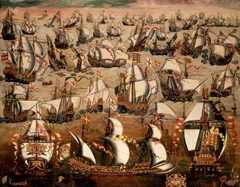|
One family historian, now passed away, suggested that
Robert Brinsmead who later settled in St. Giles in the
Wood may have sailed with the English fleet against the Spanish Armada
in 1588. He is said to have captained the ship "The Rose of Torridge" which is said to have sailed from Bideford. So far we have no facts to back up this suggestion which still
falls in the "family legend" category. It may be
inspired more by fiction, since such a ship is mentioned in Charles
Kingley's Westward Ho, based in Bideford.
Gentlemen, your hearts, I doubt
not, have already bid you, as my unworthy lips do now, to drink 'The
Rose of Torridge.' (chapter 10)
A ship of that name was registered in 1830 and there is
a Fish and Chip shop by that name in Bideford now. There is also a cafe
of that name in the Pannier Market in Great Torrington. We think
it is a worthwhile legend to pursue.
We do know that several smaller ships sailed from Devon
ports to join the fleet. We will use this page to record all we find out
about the ships involved and those who owned them or sailed in
them.
Devon had a substantial maritime presence. North Devon
ports were home for the fishing vessels that had begun to exploit the
cod fisheries off the Newfoundland shores. Devon also had a prosperous
wool trade that required ships to take the wool and cloth to market.
The only fact that might suggest a Brinsmead connection
to maritime affairs is the existence of a line of Brinsmeads in the
north of England along the Humber River. There a records of Brinsmeads
in several villages near Scunthorpe in Lincolnshire spanning over a
century. One explanation of this outpost family with a West Country name
is that they settled there because it was a trading point for the
Northern European wool trade. this is pure speculation, but it is
curious that the only Brinsmead concentration outside the West Country
is on a river flowing into the North Sea.
Oppenheim, A Maritime History of Devon says, at
page 46:
On 1 April, 1588 the more important
coast towns were ordered to equip ships, all to be above 60 tons in
burthen. Barnstable and Torrington were to send two ships and a
pinnace, Plymouth, Tavistock, and Saltash three ships and a pinnace,
Dartmouth and Totnes two ships and a pinnace, and Exeter and Topsham
three ships and a pinnace. They were all to join Drake's division at
Plymouth. Both in 1588 and later most of the port towns in Devon and
elsewhere showed an extreme unwillingness to furnish ships to serve in
the royal fleets; they did not plead that such a demand was
unconstitutional, but always professed poverty....Within a week the
townsmen of Barnstable and Torrington protested their inability; they
had suffered extremely, they said, by the loss of trade with Spain,
"the only vent for all commodities arising among us by way of
traffic.'...The adjacent hundreds were ordered to help Barnstable and
Torrington, while any further please for exemption were precluded by
directing the Lord Admiral to get a ship ready and charge he cost to
the towns and hundreds.
...
In many instances, all around the
coast, money was borrowed from individuals in anticipation of the slow
process of collection, and these persons often experienced difficulty
in obtaining repayment: Walter Edney, who equipped the Grace of God
of Topsham, was one of the sufferers, and, like several others, was
compelled to appeal to the privy council. The Bartholomew, 130
tons, Captain Nicholas Wright, the Rose, 110, Captain Thomas
Sandys, and the Gift, 25, all came from Exeter and Topsham, but
were paid by the queen, as were also the Crescent, 140 tons,
Captain John Wilson (master Christopher Waymouth), and Hart,
60, Captain James Houghton, of Dartmouth, and the Little John,
40 tons, Captain Lawrence Clayton, and Charity, of Plymouth.
There were many other Devon vessels in the fleet (*), the largest
being Ralegh's Roebuck of 300 tons.
(*) The reference here is: Cf.
Laughton, Armada Papers, ii, 326 et. seq. As yet we have not located a
copy of this record, but would like to do so.
The Drake
Family Web site contains many links to Spanish Armada topics.
|
 English Ships & the Spanish Armada
English Ships & the Spanish Armada |
![]() Did
Brinsmeads sail against the Spanish Armada?
Did
Brinsmeads sail against the Spanish Armada? English Ships & the Spanish Armada
English Ships & the Spanish Armada